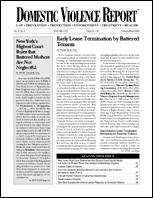U.S. Supreme Court Decides Two More Testimonial Cases
Author: Joan Zorza, Esq..
Source: Volume 11, Number 06, August/September 2006 , pp.81-82(2)

next article > |return to table of contents
Abstract:
The U.S. Supreme Court, in Crawford v. Washington, 541 U.S. 36 (2004), held that defendants had a right to confront witnesses in criminal cases, and thus barred testimonial statements of a witness whom the defendant had not had a prior opportunity to cross-examine (unless the witness appeared at the trial). But the court left open just what was a “testimonial” statement. Crawford was an important decision because it called into question the technique of prosecuting batterers when their battered victims did not attend trial, saying that reliable hearsay could no longer be admitted into evidence without the witness being available, unless it was not testimonial. In Davis v. Washington and Hammon v. Indiana, 547 U.S. ___ (2006), decided on June 19, 2006, the Court clarified the meaning of “testimonial” statements in greater detail.Keywords: forfeiture doctrine; implications of Davis case
Affiliations:
1: Editor, Domestic Violence Report.